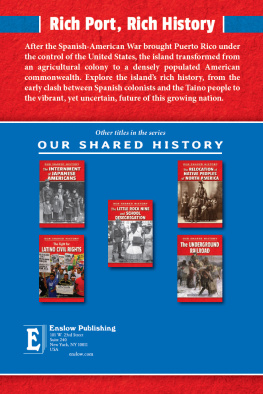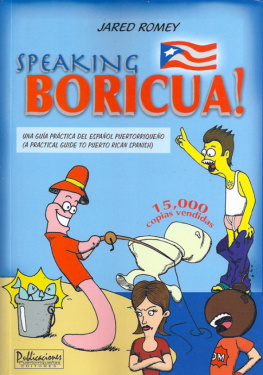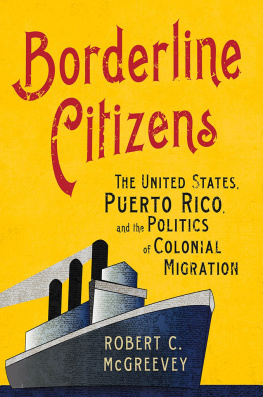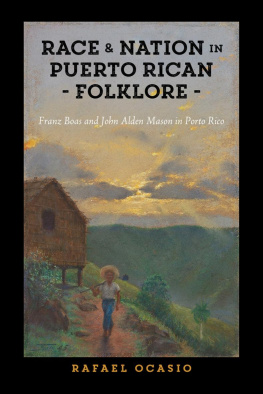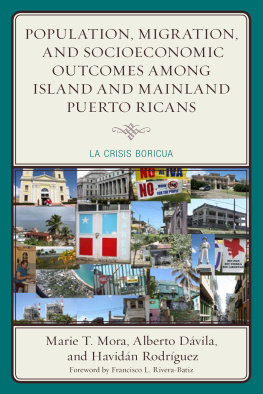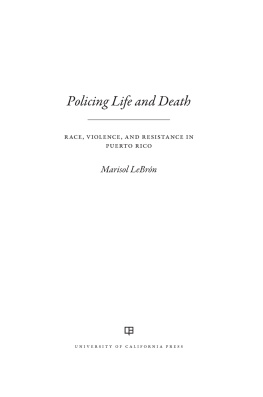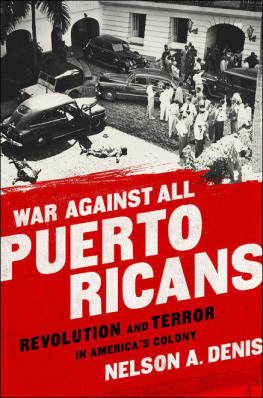2002 The University of North Carolina Press
All rights reserved
Manufactured in the United States of America
Designed by Heidi Perov
Set in Electra
by Keystone Typesetting, Inc.
The paper in this book meets the guidelines for permanence and durability of the Committee on Production Guidelines for Book Longevity of the Council on Library Resources.
This book was published with the assistance of the William Rand Kenan Junior Fund of the University of North Carolina Press.
Library of Congress Cataloging-in-Publication Data
Duany, Jorge.
The Puerto Rican nation on the move: identities on the island and in the United States / Jorge Duany.
p. cm.
Includes bibliographical references and index.
ISBN 0-8078-2704-5 (cloth: alk. paper)
ISBN 0-8078-5372-0 (pbk.: alk. paper)
eISBN : 9780807861479
1. Puerto RicoCivilization20th century. 2. Nationalism Puerto RicoHistory20th century. 3. Identity (Psychology) Puerto Rico. 4. Puerto RicansUnited StatesEthnic identity. 5. EthnicityPuerto Rico. I. Title.
F1975 .D83 2002
972.9505dc21 2001057826
cloth 06 05 04 03 02 5 4 3 2 1
paper 06 05 04 03 02 5 4 3 2 1
Acknowledgments
I completed the first draft of the manuscript for this book while enjoying a sabbatical leave from the University of Puerto Rico during the academic year 19992000. I appreciate the institutional support for writing this book, as well as the personal trust of my friends Raquel Dulzaides and Humberto Vidal, who served as witnesses to my contract with the university. During this period, I received a senior fellowship in Latino studies from the Smithsonian Institution in Washington, D.C. I thank Miguel Bretos and Marvette Prez for hosting my research project at the Smithsonian. During the summer of 1999, I was also a visiting scholar at the Population Studies Center of the University of Pennsylvania, thanks to a generous invitation by Douglas S. Massey.
Much of the archival research for this book was conducted at the Smithsonian, especially the National Anthropological Archives of the National Museum of Natural History and the Archives Center of the National Museum of American History. I also conducted research at the American Philosophical Society in Philadelphia; the Centro de Estudios Puertorriqueos of Hunter College, City University of New York; the Luis Muoz Marn Foundation in Trujillo Alto, Puerto Rico; and the Center for Historical Research of the University of Puerto Rico, Ro Piedras. I appreciate the support of the staff at these institutions. Laura Larco offered expert advice and kind help in locating unpublished manuscripts and photographs at the Smithsonian. I received special attention from Pedro Juan Hernndez during my research at the Centro de Estudios Puertorriqueos in August 1999 and later during the process of reproducing several photographs for inclusion in this book.
My colleagues Csar Ayala and Nancy Morris read the entire manuscript and made excellent suggestions for revision, most of which I have incorporated into this book. At the University of North Carolina Press, Elaine Maisner has been an enthusiastic and supportive editor. I also thank Nancy Raynor for her careful copyediting of the manuscript.
Several colleagues made perceptive comments and suggestions on earlier drafts of .
Hctor Mndez Caratini, Fernando Coronil, Yolanda MartnezSan Miguel, Amlcar Antonio Barreto, and Mara Dolores Luque suggested changes to .
I wrote the first version of at the Population Studies Center of the University of Pennsylvania during June and July 1999. Douglas S. Massey and Jorge Durand invited me to collaborate with the Latin American Migration Project at the university. Mariano Sana and Nolan Malone helped to process and analyze the results summarized in this chapter. Ninna Nyberg Srensen, Karen Fog Olwig, Douglas S. Massey, Juan Flores, Emilio Pantojas, and Raquel Z. Rivera provided useful comments and suggestions on earlier drafts. I would also like to acknowledge the efforts of the projects interviewers in Puerto Rico: Sonia Castro Cardona, Diana Johnson, Moira Prez, and Rafael Zapata.
I thank Suzanne Oboler and Anani Dzidzienyo for their invitation to prepare the original version of . I also appreciate the comments and suggestions on earlier drafts by Luis Duany, Diana Lpez, and Gabriel Haslip-Viera.
As always, I am pleased to recognize a great debt of gratitude to my family: to my wife, Diana, who has been a constant source of support, encouragement, and love for all these years; to my dear children, Patricia and Jorge Andrs, who give meaning and inspiration to my daily life; and to my late father, Rafael Duany Navarro, whom I got to know much better during his last bouts of illness before his heart could not bear it any longer. They say that ones oldest friends tend to be ones siblings; in my case, that is true. This book is fondly dedicated to my brothers and sisters, Rafael, Lourdes, Luis, Ral, and Mara Caridad, as a small token of our solidarity and affinity, despite all the differences that my mother used to analyze so well. Im sure she would be proud of all of us.
As I correct the proofs for this book, I am saddened by the passing away of my mother-in-law, Herminia Guerra Rensoli. We will all miss her intelligence, good spirits, and love of music.
Finally, I am grateful to the Puerto Rican painter, Arnaldo Roche-Rabell, for allowing me to reproduce his work, We Have to Dream in Blue, on the book cover. I feel that this image visually encapsulates the personal and collective dilemmasespecially the racial onesof living in a nation on the move.
Introduction
Rethinking
Colonialism,
Nationalism, and
Transnationalism
The Case of
Puerto Rico
Puerto Rico has a peculiar status among the countries of Latin America and the Caribbean. As one of Spains last two colonies in the New World (along with Cuba), Puerto Rico experienced the longest period of Hispanic influence in the region. On July 25, 1898, however, U.S. troops invaded the Island during the Spanish-Cuban-American War. In 1901 the U.S. Supreme Court defined Puerto Rico as foreign to the United States in a domestic sense because it was neither a state of the union nor a sovereign republic (Burnett and Marshall 2001). In 1917 Congress granted U.S. citizenship to all persons born in Puerto Rico but did not incorporate the Island as a territory. Until now, Puerto Rico has remained a colonial dependency, even though it attained a limited form of self-government as a commonwealth in 1952.
As an overseas possession of the United States, the Island has been exposed to an intense penetration of American capital, commodities, laws, and customs unequaled in other Latin American countries. Yet today Puerto Ricans display a stronger cultural identity than do most Caribbean people, even those who enjoy political independence. At the beginning of the twenty-first century, Puerto Rico presents the apparent paradox of a stateless nation that has not assimilated into the American mainstream. After more than one hundred years of U.S. colonialism, the Island remains a Spanish-speaking Afro-Hispanic-Caribbean nation. Today, the Islands electorate is almost evenly split between supporting commonwealth status and becoming the fifty-first state of the Union; only a small minority advocates independence.



